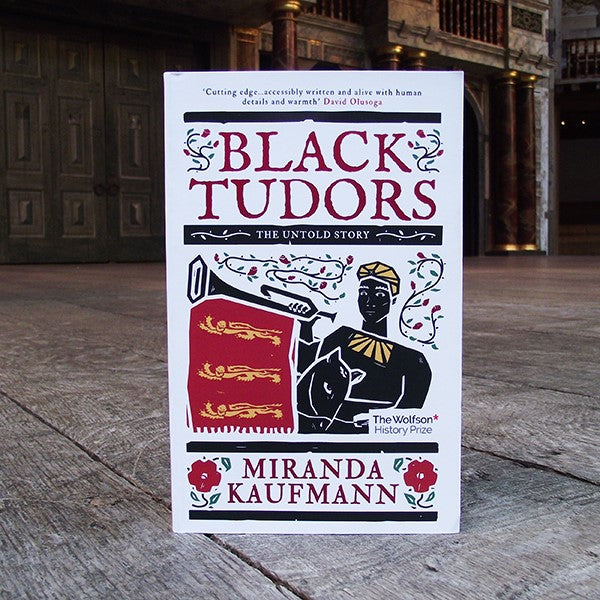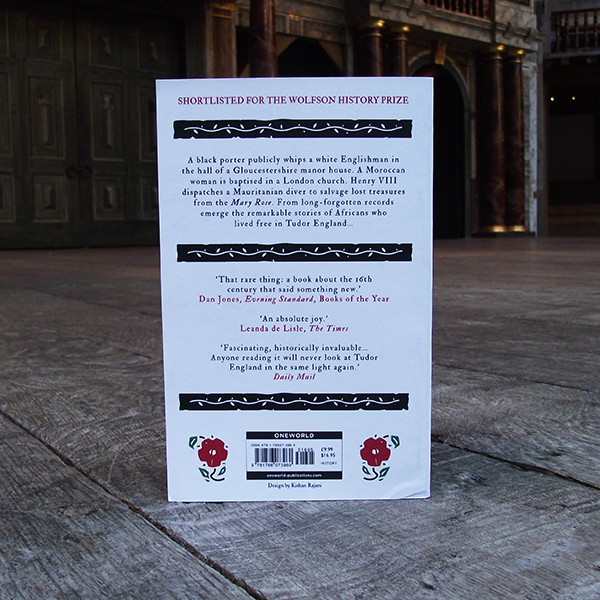The untold stories of the black Tudors, dazzlingly brought to life by Miranda Kaufmann, will transform how we see this most intriguing period of history.
A black porter publicly whips a white Englishman in the hall of a Gloucestershire manor house. A Moroccan woman is baptised in a London church. Henry VIII dispatches a Mauritanian diver to salvage lost treasures from the Mary Rose. From long-forgotten records emerge the remarkable stories of Africans who lived free in Tudor England.
Every purchase you make supports the work of Shakespeare's Globe. Thank you!
Detail
Author: Miranda Kaufmann
Format: Paperback
Size: 128 mm x 198 mm
Pages: 376
Staff Review
Miranda Kaufman’s book gives a fascinating insight into the Tudor period , and the frequently inaccurate ideas we have had about the role of black people within this society . Even in our own time there is a general belief that the people who arrived at Tilbury on the Windrush in 1948 were among the earliest black immigrants to this country . But as her very well researched book shows , when Elizabeth 1st was making her rousing speech in defiance of the Spanish Armada 360 years earlier , it was entirely possible that people of African origin could also have been present in the crowd at Tilbury .
Historically the status of black people in society has very often been viewed through the history of colonialism and enslavement , but in “Black Tudors” she explores a different way of looking at this relationship .Research suggests that there had been powerful Africans in England since Roman times – eg. Septimius Severus, an emperor from Libya , Quintus Lollius Urbicus ,an Algerian Governor , and people of great wealth and status ,as well as soldiers and slaves.
She describes the changing political world of 15th Century Europe , when Spain laid claim to the Americas and the Caribbean , and the Portuguese had reached India (via Africa), bringing back the first enslaved Africans to Europe . By the 1580s the two empires were united under Philip II controlling a transatlantic slave trade. During the course of the century the Spanish and Portuguese had transported 370,000 Africans , scattered across Europe and the colonies . But at this time England still had a diplomatic and trading relationship with Africa.
According to a court ruling in 1569 , it seems that , on arrival in England , a former slave would be considered free - though in reality their life could be as harsh as any other Tudor . The arrival of foreigners in England might be a matter of curiosity rather than concern and the author suggests that strangers would be judged by their class, their skills, their religion, rather than the colour of their skin . Social acceptance was based on being a God fearing soul who had been baptized.
She uses archival sources including parish registers (baptisms , marriages and deaths), church records , tax returns , household accounts, legal records, wills , diaries , letters etc to establish the presence of black people at this time . But as she says , these documents are factual , they record what happened to Africans in Tudor England , not what people actually thought of them , but how they were treated on a daily basis . There is evidence that a growing number of black people were not only present in the Royal Courts of the Tudor monarchs and the households of the aristocracy, but throughout all levels of society were settled in their communities trying to make a living. Her approach is to give an account of the lives of ten of these black Tudors whose experiences highlight the history of this period .
I found it very moving to read through this list of names resurrected from history as a result of extraordinary scholarship.The ten people whose stories we’ve learned about come alive on the page, featured in the book because their lives have been documented so systematically. But also it covers a period where Britain had not yet engaged so totally in the tragedy of the slave trade. Miranda Kaufman suggests that archival research is the most productive method by which the true story of Black Tudors can be studied .This method may be usefully employed in other European countries to create a wider discussion about the status of African people in the early modern period , and why this changed so catastrophically over the next century .
Reviewed by VB (Tour Guide)



